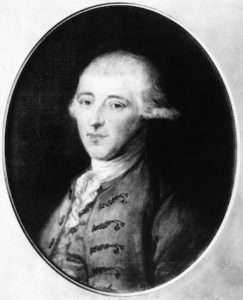
Pierce Butler
*Pierce Butler was born on this date in 1744. He was a white Irish American rice planter, slaveholder, politician, and military officer during the Antebellum South. Butler was born in Garryhundon, County Carlow, Ireland, into the Anglo-Irish Protestant Ascendancy. He was an Anglican until after the American Revolution, when he became a member of the Episcopal Church. He resigned from a commission in the British Army in 1773 and settled with his wife, Mary, in South Carolina.
During the Revolutionary War, Britain was shifting its war strategy. By 1778, King George III and his ministers faced a new military situation in the Colonies. The British developed a "southern strategy." They believed that the many Loyalists in the southern states (with whom the British had an active trade through cotton, rice, and tobacco) would rally to the Crown if supported by regular troops. They planned a conquest of the rebellious colonies one at a time, moving north from Georgia. They launched their new strategy by capturing Savannah in December 1778.
In early 1779, Butler helped reorganize South Carolina's defenses as the state's adjutant general, a position that carried the rank of brigadier general. Butler joined in mobilizing South Carolina's militia to resist the threatened British invasion. The hastily raised and poorly prepared militia troops could not compete with the well-trained British regulars, and the Patriots' effort to relieve Savannah failed. In 1780, the British captured Charleston, South Carolina, with most of the colony's civil government and military forces.
Butler escaped as part of a command group deliberately located outside the city. He developed a counterstrategy over the next two years to defeat the enemy's southern operations. Refusing to surrender, allies in South Carolina and the occupied portions of Georgia and North Carolina organized a resistance movement. As adjutant general, Butler worked with former militia and Continental Army members. He was a special target for the British occupation forces. Throughout the closing phases of the Southern campaign, he donated cash and supplies to help sustain the American forces and assisted in the administration of prisoner-of-war facilities.
Politics
He served as a state legislator, a member of the Congress of the Confederation, a delegate to the 1787 Constitutional Convention, where he signed the United States Constitution, and a member of the United States Senate. Following his wife's death in 1790, Butler sold off the last of their South Carolina holdings and invested in Georgia Sea Island plantations. Butler hired Roswell King to manage his two plantations on St. Simon's Island and Butler Island. As one of the largest slaveholders in the United States, he defended American slavery for political and personal motives.
In 1793, Butler introduced the Fugitive Slave Clause into a draft of the U.S. Constitution. He supported counting the entire slave population in state totals for Congressional apportionment. The Constitution's Three-fifths Compromise counted only three-fifths of the slave population in state totals, giving white voters in Southern states power in the U.S. Congress. Butler retired from politics in 1805 and spent much of his time in Philadelphia, at a summer home. He became one of the wealthiest men in the nation, with huge land holdings in several states, through his business ventures. Like other Founding Fathers from his region, Butler also continued to support the institution of slavery. Butler never acknowledged the fundamental inconsistency between defending the people's freedom and supporting slavery.
Some associates called Butler "eccentric" and an "enigma." He followed his path to produce the maximum liberty and respect for people he considered citizens. He wanted to maintain a strong central government but one that could never ride roughshod over the rights of the private citizen. He opposed the policies of the Federalists under Alexander Hamilton because he believed they had sacrificed the interests of Westerners and had sought to force their policies on the opposition. He later split with Jefferson and the Democrats for the same reason.
Butler emphasized his belief in the role of the commoner. Late in life, he summarized his view: "Our System is little better than [a] matter of Experiment. ... much must depend on the morals and manners of the people at large." Butler came out of retirement briefly in 1816 to become a director of the Second Bank of the United States. Declining health forced him to refuse a second term. After an extended illness, Butler died on February 15, 1822, and was buried in Philadelphia's Christ Church Cemetery.